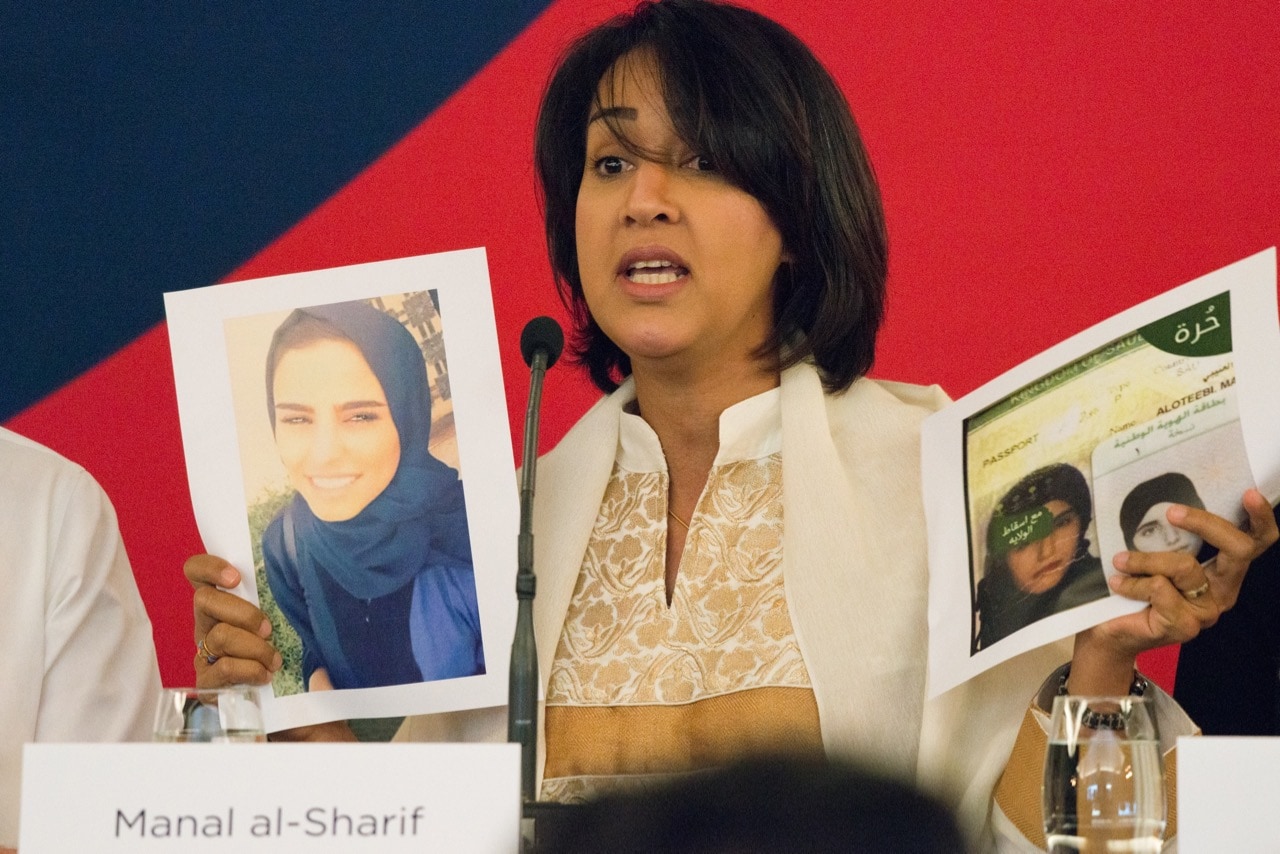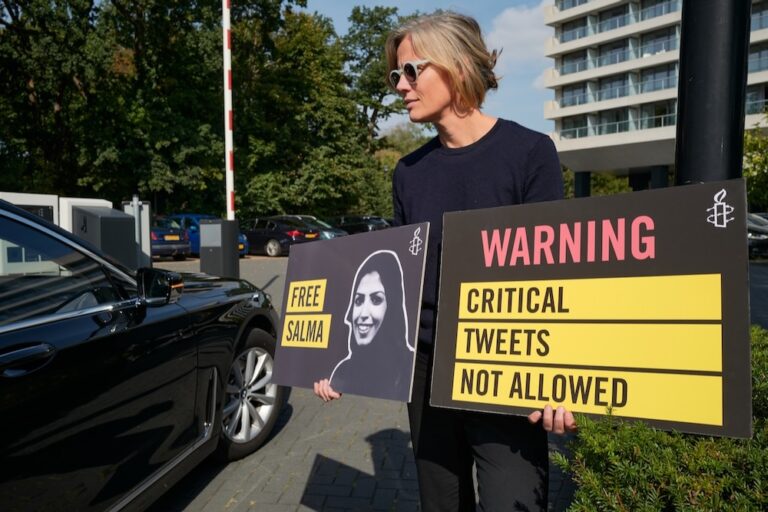Israa Al-Ghomgham stands to become the first woman in Saudi Arabia to face capital punishment for human rights activism - one 'first' that has received scant media attention.
Sarah Al-Otaibi is a women’s rights activist based in the United Kingdom. Her insights on female empowerment in Saudi Arabia have been published by “Women’s March”, “The New Arab”, and “Middle East Eye”.
Saudi Arabia has pursued an aggressive PR campaign over the past year marketing Crown Prince Mohammed bin Salman (MBS) as a proponent of women’s rights. Electronic billboards and news headlines – bought and paid for by the Saudi monarchy – have highlighted the stories of ‘trailblazing’ Saudi women, now free to drive Formula One cars and become air traffic controllers thanks to MBS.
Israa Al-Ghomgham, however, never made the cut. She stands to become the first woman in Saudi Arabia to face capital punishment for human rights activism – one ‘first’ that has received scant media attention.
Al-Ghomgham and her husband were arrested in December 2015 for their documentation of protests in Qatif. The region, located in Saudi Arabia’s Eastern Province, is home to a sizeable Shi’a population – a community treated as second-class citizens by the Sunni monarchy. Saudi authorities accused Al-Ghomgham of ‘inflaming public opinion’, ‘hostility towards the regime’, and ‘providing moral support to rioters’. Public prosecutor Saud Al-Mujib pressed for the death penalty as punishment.
Mohammed bin Salman’s ‘reformist’ image has only recently come under scrutiny, following the murder of journalist Jamal Khashoggi. The West has ignored the dark precedent that al-Ghomgham’s execution could set. What will be the fate of Loujain Al-Hathloul, Samar Badawi, Hatoon al-Fassi, and the scores of other Saudi feminists detained for their women’s rights advocacy?
The Saudi regime has never been one to tolerate opposition. But under MBS, the dangers that dissidents face have worsened considerably. It is not merely the Kingdom’s willingness to kill its critics – as in Khashoggi’s assassination and al-Ghomgham’s slated execution – but the Orwellian atmosphere that it has created in once safe spaces.
Before being sacked as advisor to the Royal Court, Saud Al-Qahtani commanded a veritable army of ‘electronic flies’. This mix of sock-puppets and bot accounts identify, track, and target Saudi activists on Twitter and other outlets. Their method is simple enough: profile activists gaining traction on social media, monitor their activity, and attack when and where they are vulnerable.
Take the case of Montréal-based activist Omar Abdulaziz, who experienced this during Saudi Arabia’s recent diplomatic spat with Canada. On 2 August, Foreign Affairs Minister Chrystia Freeland had tweeted her concerns about the arrest of Samar Badawi, the sister of jailed activist blogger Raif Badawi, whose wife and children live in Canada. Global Affairs Canada posted a tweet the next day, urging Saudi Arabia to release the civil and women’s rights activists. The kingdom responded with a series of angry tweets, and initiated strong retaliatory measures against the country.
On 5 August, Abdulaziz composed several tweets criticising Riyadh’s position. A mere two days later, he informed his Twitter followers that authorities had threatened to detain his two brothers and several of his friends in Saudi Arabia – who were arrested, sure enough, weeks later.
Despite the social media outlet’s denials, some reports suggest that Twitter has helped Saudi Arabia hunt down dissenters. An anonymous source of British outlet Metro confirmed that Twitter’s Dubai office provided information on journalist Turki al Jasser – who ran Kashkool, a handle that exposed corruption within the royal family – at the request of Saudi officials earlier this year. Al Jasser is now deceased, having been ‘tortured to death’ while in custody – the second journalist killed in over a month.
Online repression – coupled with Twitter’s tacit support of it – led activist Manal Al-Sharif to quit social media entirely. A proponent of women’s rights and an outspoken feminist, Al-Sharif deleted her Twitter handle during a lecture at SingularityU Nordic. “If the same tools we joined for our liberation are being used to oppress us and undermine us… I’m out of these platforms,” she asserted, as she deactivated her account.
And though some criticised Al-Sharif for her decision, her fears are anything but unfounded. Aside from the ruthless manner in which Saudi Arabia hunts down activists on social media, reports have surfaced that jailed women’s rights activists are experiencing psychological, physical, and sexual abuse in prison.
With the grave danger that Saudi activists face on the Twittersphere and beyond, human rights groups are taking action. Since May 2018, Women’s March Global has amplified a petition calling on the United Nations to press Saudi Arabia to free jailed activists.
On 11 September, Human Rights Watch launched a campaign aimed at car manufacturers to halt business with the Kingdom. The organisation alluded to the irony that Saudi authorities detained Loujain al-Hathloul, Ensaf Haidar, Aziza al-Yousef and other feminists for their opposition to the driving ban, just days before it was lifted by MBS to international acclaim.
Across the U.K., a petition calling on British Foreign Secretary Jeremy Hunt to prevent Israa Al-Ghomgham’s execution is being circulated.
Given the ornamental nature of activism in the West today, where flag filters and ‘thoughts and prayers’ are pervasive across the social media landscape, it is imperative that those sympathetic to the plight of al-Ghomgham and countless other Saudi dissidents make concerted, visible efforts. Signing and sharing petitions, and encouraging others to do the same, is critical. Using hashtags such as #FreeSaudiActivists is also key to generating attention – and countering the fake hashtags of the ‘electronic flies’ that advance narratives of the Saudi regime.
Taking a proactive stance against Saudi censorship is even more crucial. Regardless of whether or not Twitter bears culpability in the arrest and death of Turki al Jasser, the network continues to provide the Kingdom a space to conduct its cyber-operations. Despite being ousted from his position, Saud al-Qahtani’s handle remains fully operational. Does Twitter earnestly accept someone whom even the Crown Prince has shunned? More voices must call on Twitter to suspend al-Qahtani – responsible for the jailing of so many champions of free speech – from the platform.
What of al-Qahtani’s garrison of sock-puppets and bots? Both Oslo-based entrepreneur and writer Iyad el-Baghdadi and Doha-based professor March Owen Jones have done great work to expose fake Saudi handles and hashtags. But the task is daunting: thousands, if not hundreds of thousands, of ‘electronic flies’ infest social media.
Users can help, by noting suspicious accounts. There are several key signs: certain hashtags originating from Saudi Arabia and peddled exclusively by pro-Saudi handles, profile or header photos glorifying King Salman or MBS, and aggressive pushback and ‘whataboutism’ in response to posts highlighting jailed dissidents. Once identified, these suspect accounts should be reported – repeatedly, if necessary – to Twitter. Doing so will not only deprive the Saudi regime of a channel for its propaganda and oppression, it will help reestablish a safe space for free speech.



